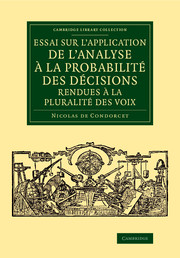Crossref Citations
This Book has been
cited by the following publications. This list is generated based on data provided by Crossref.
Labour, Michel
2010.
L’apport de la méthode triadique à l’analyse des pratiques informationnelles.
Études de communication,
p.
77.
Martimort, David
2012.
Faire des sciences sociales. Critiquer.
p.
209.
Dugas, Éric
and
Hébert, Thibaut
2013.
Quels types de victimes potentielles sont privilégiés au collège ?.
Recherches & éducations,
p.
62.
Endreß, Tobias
2015.
Banking & Innovation 2015.
p.
237.
Rott, Hans
2016.
Readings in Formal Epistemology.
p.
269.
Mann, Richard P.
Woolley-Meza, Olivia
and
Kuhn, Tobias
2017.
Maintaining intellectual diversity in data science.
Data Science,
Vol. 1,
Issue. 1-2,
p.
85.
Pignol, Claire
2017.
La théorie de l’équilibre général.
p.
123.
Devereaux, Abigail N.
and
Wagner, Richard E.
2018.
James M. Buchanan.
p.
109.
Zahmatkesh, Shima
and
Della Valle, Emanuele
2020.
Relevant Query Answering over Streaming and Distributed Data.
p.
55.
Caliskan, Cantay
2020.
The Influence ofEliteNetworks on Green Policy Making.
Politics & Policy,
Vol. 48,
Issue. 6,
p.
1104.
Seim, Jonathan
2021.
Politische Partizipation.
p.
95.
Ezugwu, Absalom E.
Shukla, Amit K.
Agbaje, Moyinoluwa B.
Oyelade, Olaide N.
José-García, Adán
and
Agushaka, Jeffery O.
2021.
Automatic clustering algorithms: a systematic review and bibliometric analysis of relevant literature.
Neural Computing and Applications,
Vol. 33,
Issue. 11,
p.
6247.
Hernández, Diego Mauricio
2021.
EL CONCEPTO DE DEMOCRACIA: UN ANÁLISIS MULTIDIMENSIONAL.
Novos Estudos Jurídicos,
Vol. 26,
Issue. 2,
p.
623.
Cornelio, Cristina
Donini, Michele
Loreggia, Andrea
Pini, Maria Silvia
and
Rossi, Francesca
2021.
Voting with random classifiers (VORACE): theoretical and experimental analysis.
Autonomous Agents and Multi-Agent Systems,
Vol. 35,
Issue. 2,
Rosenberg, Louis
Domnauer, Colin
Willcox, Gregg
and
Schumann, Hans
2022.
Proceedings of the Future Technologies Conference (FTC) 2021, Volume 1.
Vol. 358,
Issue. ,
p.
239.
Trung, Bui Quoc
Duc, Le Minh
and
Anh, Bui Thi Mai
2022.
Advances and Trends in Artificial Intelligence. Theory and Practices in Artificial Intelligence.
Vol. 13343,
Issue. ,
p.
226.
Evans, Emily J.
Jones, Rebecca
Leung, Joseph
Webb, Benjamin Z.
and
Huk, Maciej
2022.
Using social networks to improve team transition prediction in professional sports.
PLOS ONE,
Vol. 17,
Issue. 6,
p.
e0268619.
Aminifar, Amin
Shokri, Matin
Rabbi, Fazle
Pun, Violet Ka I.
and
Lamo, Yngve
2022.
Extremely Randomized Trees With Privacy Preservation for Distributed Structured Health Data.
IEEE Access,
Vol. 10,
Issue. ,
p.
6010.
Stickler, Megan
Ott, William
Kilpatrick, Zachary P.
Josić, Krešimir
and
Karamched, Bhargav R.
2023.
Impact of correlated information on pioneering decisions.
Physical Review Research,
Vol. 5,
Issue. 3,
Domnauer, Colin
Willcox, Gregg
and
Rosenberg, Louis
2023.
Proceedings of the Future Technologies Conference (FTC) 2022, Volume 1.
Vol. 559,
Issue. ,
p.
378.



